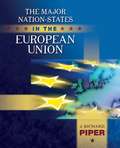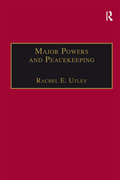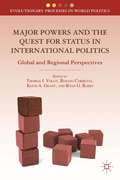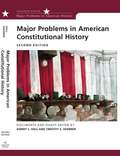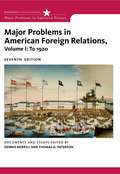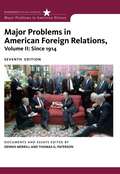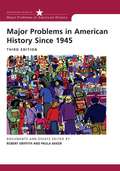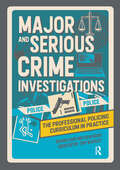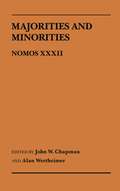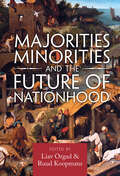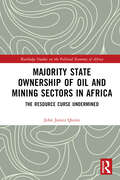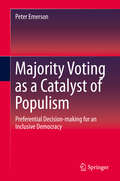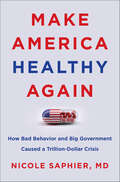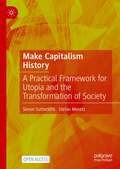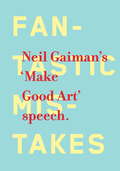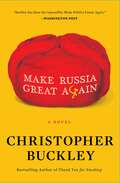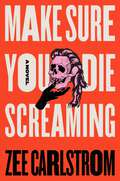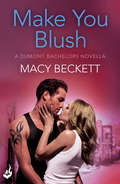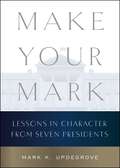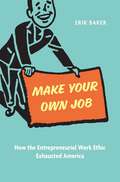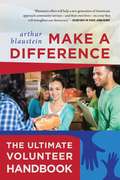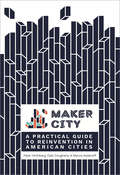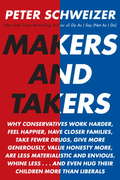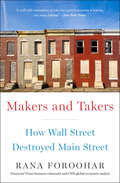- Table View
- List View
Major League Sports and the Property Tax: Costs and Implications of a Stealth Tax Expenditure (Sports Economics, Management and Policy #22)
by Geoffrey PropheterThis book updates the public policy dialogue on major league sports facilities and the property tax in the US. By providing a rigorous treatment of the property tax within the context of major league sports facilities, this volume debunks the widely asserted claim that most major league teams do not pay property taxes. The chapters methodically lay out the property tax status of every activity major league facility, the actual worth of that property tax expenditure, and the impact of property tax exemptions on local public services. Using empirical data, the volume provides a foundation for informed policy making regarding major league sports facilities. As such, this book will be a useful tool for researchers and students in sports economics, sports management, public policy, and public finance, as well as practitioners involved in the policy process.Economists have extensively studied the billions of dollars that state and local governments have devoted to funding professional sports stadiums. However, the implicit subsidies that stadiums typically receive through property tax exemptions has received scant attention. In Major League Sports and the Property Tax, Geoffrey Propheter thoroughly examines the common practice of removing sports venues from local tax rolls, which results in millions of dollars in forgone tax revenue that is often not reported in the public accounting of costs. Propheter provides a detailed examination of how property taxes are administered and the implications that derive from stadium property tax exemptions and abatements. His comprehensive analysis presents stylized facts and specific examples that provide the most thorough treatment on the subject to date. The breadth of analysis and meticulous coverage of relevant issues demonstrates why Propheter has emerged as a leading expert on the economics of stadiums. This is perhaps the most important book on the public financing of stadiums written in the past decade, and anyone interested in stadium economics will want their own copy to read and reference. JC Bradbury, Professor of Economics, Kennesaw State University
Major Nation-States in the European Union
by J. Richard PiperIntegrating the study of individual European nation-states within the framework of the European Union, this unique new text is essentially two books in one: a book on the EU and a comparative introduction to European politics. This text provides more value to students by combining two texts in one, but engages student interest and facilitates learning through a variety of useful features. Role-playing exercises encourage participation and test students' critical thinking skills, while an emphasis on the people behind the politics "humanizes" material and provides lively insights into contemporary European politics and society. To ensure student understanding, there is extensive material comparing and contrasting EU states to one another and to the United States, a thorough glossary at the end of the book, and an abundance of examples, tables, charts, and graphs to illustrate and extend the discussions.
Major Powers and Peacekeeping: Perspectives, Priorities and the Challenges of Military Intervention
by Rachel E. UtleyThe problems of peacekeeping in Somalia, Rwanda and former Yugoslavia marked a turning point for major powers in international military peacekeeping. Major support for a more pro-active UN role in peacekeeping has not been forthcoming and where major power involvement is deemed vital, non-UN peace operations have increasingly become the norm. This valuable volume explores the continuing significance of peacekeeping in international affairs, particularly in terms of its military dimensions, and examines the priorities and perspectives of the major powers in relation to their military participation in international peacekeeping and wider peace operations in the twenty-first century. It is ideal for scholars and students interested in contemporary international politics, international relations, international organizations, security and strategic studies, conflict resolution and foreign policy analysis.
Major Powers and the Quest for Status in International Politics
by Thomas J. Volgy Renato Corbetta Keith A. Grant Ryan G. BairdThis book explores the effects and consequences of major global power and major regional power status attribution on the foreign policies of states striving for such status and the consequences of status differentiation for the international system and the post-Cold War international order.
Major Problems In American Constitutional History: Documents And Essays
by Kermit Hall Timothy S. HuebnerDesigned to encourage critical thinking about history, the Major Problems series introduces students to both primary sources and analytical essays on important topics in US history.This collection, designed to be the primary anthology for the introductory survey course, covers the entire chronological span of Constitutional history.Tracing the historical development of American constitutional thought, the Second Edition of this anthology presents the documents critical to constitutional development, including actual legal texts as well as the reactions of prominent legal minds.
Major Problems In American Foreign Relations - To 1920: Volume 1 (Major Problems In American History)
by Thomas Paterson Dennis MerrillDesigned to encourage critical thinking about history, this reader uses a carefully selected group of primary sources and analytical essays to allow students to test the interpretations of distinguished historians and draw their own conclusions about the history of American foreign policy. This text serves as an effective educational tool for courses on U.S. foreign policy, recent U.S. history, or 20th Century U.S. history. The Seventh Edition introduces new studies on America's early foreign relations which seek to position the nation's post 9-11 attitudes and behaviors within historical context. Some of the new literature spotlights cultural relations, and the ways in which culturally constructed attitudes about class, gender, race, and national identity have shaped American's perceptions of the world and subsequently its overseas relationships. In this volume, almost one-half of the essays are new, including selections by Michael L. Krenn, Walter A. Hixson, Robert Kagan, John Lamberton Harper, Marie-Jeanne Rossignol, Joseph J. Ellis, John E. Lewis Jr., Piero Gleijeses, Stuart Banner, McCabe Keliher, Michael H. Hunt, Kristin L. Hoganson, Paul A. Kramer, Stanley Karnow, Robert W. Tucker, and Erez Manela.
Major Problems In American Foreign Relations Since 1914: Volume 2 (Major Problems In American History)
by Thomas Paterson Dennis MerrillDesigned to encourage critical thinking about history, this reader uses a carefully selected group of primary sources and analytical essays to allow students to test the interpretations of distinguished historians and draw their own conclusions about the history of American foreign policy. This text serves as an effective educational tool for courses on U.S. foreign policy, recent U.S. history, or 20th Century U.S. history. Some of the new literature spotlights cultural relations, and the ways in which culturally constructed attitudes about class, gender, race, and national identity have shaped American's perceptions of the world and subsequently its overseas relationships. In this volume, almost one-half of the essays are new, including selections by Laura McEnaney, Michael L. Krenn, Walter A. Hixson, Robert W. Tucker, Erez Manela, Victoria de Grazia, Thomas F. O'Brien, John Lewis Gaddis, Andrew J. Rotter, Chen Jian, Vladislov Zubok, Michelle Mart, Christina Klein, Randall Woods, Jeremi Suri, Carol Eisenberg, Salim Yaquib, Melvyn P. Leffler, Arne Odd Westad, and George C. Herring. This new edition includes expanded coverage of U.S. policy toward the Third World. New selections explore the U.S. presence in Latin America during the interwar era and the Middle East during the early Cold War and the era of detente. Others examine U.S. relations with Southeast Asia prior to U.S. military escalation in the Vietnam War and the negotiations pursued by the Richard Nixon administration to end that conflict. Recently released documents on Ronald Reagan's presidency and the end of the Cold War have also been added. Finally, the last chapter had been revised to focus on the administration of George W. Bush and its response to the terrorist attacks of September 11th, including the on-going wars in Iraq and Afghanistan.
Major Problems in American History Since 1945: Documents and Essays
by Robert Griffith Paula BakerDesigned to encourage critical thinking about history, the Major Problems in American History series introduces students to both primary sources and analytical essays on important topics in U. S. history. This reader serves as the primary anthology for the introductory survey course, covering the subject's entire chronological span. Comprehensive topical coverage includes the Cold War, the cultural and political movements of the 60s, the return of conservatism, life in the new information age, and race and ethnicity. In the Third Edition, greater emphasis is placed on social and cultural history, and a new chapter focuses on 9/11, the war on terror, and the war in Iraq.
Major and Serious Crime Investigations (The Professional Policing Curriculum in Practice)
by Richard Carr Colin DaviesThis text explores the concept of major and serious crime investigations as it takes the reader through the fundamental elements of investigative theory and practice that are relevant to this area of criminality.Unlike other texts that concentrate on either bespoke areas of criminality such as homicide, terrorism or tends in concepts such as county lines, this book recognises that the reader will be new to investigative study with little practitioner experience to anchor their learning. By using the latest evidence-based policing knowledge and critical thinking, it explores the concepts of major and serious crime, detailing key areas of legislation and how investigative strategies and decision making can influence successful outcomes. Other topics examined in this text is the key areas of risk for major and serious crime investigations, the impact on investigators, the concept of disclosure, investigative interviewing and how civil orders, designed to tackle this type of criminality can provide a successful alternative to prosecution.Both students and practitioners can find this book useful with this book's contemporary approach of using case studies and contemporary investigative examples relevant to the topic. This book brings together academic theory and operational understanding of major and serious crime that provides learners with an easy to follow guide that they can keep returning to throughout their career.
Majorities and Minorities: Nomos XXXII (NOMOS - American Society for Political and Legal Philosophy #25)
by John W. Chapman Alan WertheimerIn this thirty-second annual volume in the American Society for Political and Legal Philosophy's NOMOS series, entitled Majorities and Minorities, thirteen distinguished contributors consider a diverse selection of topics. Included are essays on legitimacy of the majority, the utilitarian view of majoritarianism, majorities and elections, pluralism and equality, democratic theory, and American democracy and majority rules. Of Interest to political scientists, philosophers, and legal scholars, this collection brings together a variety of viewpoints. Each author is a leading voice within his or her specialized field.
Majorities, Minorities, and the Future of Nationhood
by Ruud Koopmans Liav OrgadThe design of democratic institutions includes a variety of barriers to protect against the tyranny of the majority, including international human rights, cultural minority rights, and multiculturalism. In the twenty-first century, majorities have re-asserted themselves, sometimes reasonably, referring to social cohesion and national identity, at other times in the form of populist movements challenging core foundations of liberal democracy. This volume intervenes in this debate by examining the legitimacy of conflicting majority and minority claims. Are majorities a legal concept, holding rights and subject to limitations? How can we define a sense of nationhood that brings groups together rather than tears them apart? In this volume, world-leading experts are brought together for the first time to debate the rights of both majorities and minorities. The outcome is a fascinating exchange on one of the greatest challenges facing liberal democracies today.
Majority State Ownership of Oil and Mining Sectors in Africa: The Resource Curse Undermined (Routledge Studies on the Political Economy of Africa)
by John James QuinnMajority State Ownership of Oil and Mining Sectors in Africa: The Resource Curse Undermined shows that countries in sub-Saharan Africa with majority state ownership of their major oil or mineral export sectors suffered from more severe versions of the natural resource curse than other similar countries. Examining natural resource exporting nations in sub-Saharan Africa between 1966 to 2000, Quinn shows that on average, states with majority state ownership of these sectors featured lower growth, lower incomes, declining alternative export sectors, more debt, lower levels of investment, lower levels of political and civil rights, and more domestic conflict than other similar countries. These results remained fairly consistent across both cross-country data, as well as in paired case studies. One surprise finding is that these countries either had depreciating currencies, or did not feature high levels of currency appreciation, on average, which is inconsistent with resource curse literature predictions. Rather, most countries with majority state ownership had high levels of currency overvaluation – which operated in a similar manner as currency appreciation. This work should appeal to students and faculty interested in the political economy of development, the natural resource curse, and African development, as well as politicians, policy makers, and NGO workers working in these areas. The strong recommendation of the book is that governments should control 50% or less of these sectors.
Majority Voting as a Catalyst of Populism: Preferential Decision-making for an Inclusive Democracy
by Peter EmersonThis timely book presents a critique of binary majority rule and provides insights into why, in many instances, the outcome of a two-option ballot does not accurately reflect the will of the people. Based on the author's first-hand experience, majority-voting is argued to be a catalyst of populism and its divisive outcomes have prompted countless disputes throughout Europe and Asia. In like manner, simple majority rule is seen as a cause of conflict in war zones, and of dysfunction in so-called stable democracies. In order to safeguard democracy, an all-party power-sharing approach is proposed, which would make populism less attractive to voters and governments alike. In geographically arranged chapters, well-tested alternative voting procedures (e. g. non-majoritarian Modified Borda Count) are presented in case studies of Northern Ireland, Central Europe, the Balkans, the Caucasus, Russia, China, North Korea and Mongolia.
Make America Healthy Again: How Bad Behavior and Big Government Caused a Trillion-Dollar Crisis
by Nicole SaphierNATIONAL BESTSELLER!If Americans want to know why their health care is so costly and getting costlier, they need only look in the mirror.Americans are notoriously unhealthy—we eat too much, drink too much, and sit too much. When roughly 80 percent of cardiovascular disease and 40 percent of all cancer cases could be prevented by simple lifestyle changes, it is time to take a deeper look at the problem and ask who is truly responsible. Consider that: · After seventy years of innovation, heart disease and cancer remain the top two causes of death in the United States.· In 1960, health care spending was 5 percent of America's GDP; today, it is 17.5 percent.· The government spends over $1 trillion annually on health care.· Nearly one in five American deaths is associated with poor diets.· Simply reducing sodium intake by 1,200 mg per day could save up to $20 billion a year in medical costs. In Make America Healthy Again, Nicole Saphier, a Memorial Sloan Kettering physician, nationally recognized patient advocate, and media personality, reveals how individual negligence and big government incompetence have destroyed America’s health care system. Combining historical events, economic trends, and essential lifestyle advice, with her unique perspective, she offers concrete solutions to address this epic problem.We don’t need socialized medicine—we need to take better care of ourselves. By getting healthier and adopting preventative measures, Saphier believes, we can reduce the astronomical costs of treatment and improve overall care. The only way to lower medical costs for everyone is to stop incentivizing bad health decisions. Policies such as the Affordable Care Act and single-payer plans ignore something crucial to lowering the overall financial burden: personal responsibility. We can no longer expect doctors and the government to fix illnesses we have the power to prevent. Regardless of which health policy is adopted, our nation will flounder unless we take action. It is up to the American people to make America healthy again.
Make Capitalism History: A Practical Framework for Utopia and the Transformation of Society
by Stefan Meretz Simon SutterlüttiThis open access book presents an alternative to capitalism and state socialism through the modelling of a post-market and post-state utopia based on an upscaling of the commons, feminist political economy and democratic and council-based planning approaches. It discusses the left’s need to explore non-capitalist modes of production, the inability of green or socialist market economies to produce real social and ecological change, and the need to look beyond traditional ideas of reform and revolution. The book discusses how a socio-economic organisation beyond money, wage labour, patriarchal division of work and centralised state planning may look like. It develops an approach to societal transformation based on seed forms of commons practices and social movements. This book will be relevant to activists, students and researchers interested in fundamental social change, political economy and feminist and Marxist economics.This is an open access book.
Make Good Art
by Neil GaimanFrom the bestselling author of the acclaimed novel AMERICAN GODS and the prize-winning THE OCEAN AT THE END OF THE LANE.In May 2012, Neil Gaiman delivered the commencement address at Philadelphia's University of the Arts, in which he shared his thoughts about creativity, bravery, and strength. He encouraged the fledgling painters, musicians, writers, and dreamers to break rules and think outside the box. Most of all, he urged them to make good art.The book MAKE GOOD ART, designed by renowned graphic artist Chip Kidd, contains the full text of Gaiman's inspiring speech.Praise for Neil Gaiman:'A very fine and imaginative writer' The Sunday Times'Exhilarating and terrifying' Independent'Urbane and sophisticated' Time Out'A jaw-droppingly good, scary epic positively drenched in metaphors and symbols... As Gaiman is to literature, so Antoni Gaudi was to architecture' Midweek'Neil Gaiman is a very good writer indeed' Daily Telegraph
Make Russia Great Again: A Novel
by Christopher BuckleyIn &“the Trump satire we&’ve been waiting for&” (The Washington Post), award-winning and bestselling author of Thank You for Smoking delivers a hilarious and whipsmart fake memoir by Herb Nutterman—Donald Trump&’s seventh chief of staff—who has written the ultimate tell-all about Trump and Russia.Herb Nutterman never intended to become Donald Trump&’s White House chief of staff. Herb served the Trump Organization for twenty-seven years, holding jobs in everything from a food and beverage manager at the Trump Magnifica to being the first general manager of the Trump Bloody Run Golf Course. And when his old boss asks &“his favorite Jew&” to take on the daunting role of chief of staff, Herb, spurred on by loyalty agrees. But being the chief of staff is a lot different from being a former hospitality expert. Soon, Herb finds himself deeply involved in Russian intrigue, deflecting rumors about Mike Pence&’s high school involvement in a Satanic cult, and leading President Trump&’s reelection campaign. What Nutterman experiences is outrageous, outlandish, and otherwise unbelievable—therefore making it a deadly accurate account of being the chief of staff during the Trump administration. With hilarious jabs at the biggest world leaders and Washington politics overall, Make Russia Great Again is a timely political satire from &“one of the funniest writers in the English language&” (Tom Wolfe).
Make Sure You Die Screaming: A Novel
by Zee CarlstromAn electrifying debut about a nonbinary corporate burnout embarking on a road trip from Chicago to Arkansas to find their conspiracy-theorist father, who has gone missing—for fans of Detransition Baby and Chain-Gang All-StarsThe newly nameless narrator of Make Sure You Die Screaming has rejected the gender binary, has flamed out with a vengeance at their corporate gig, is most likely brain damaged from a major tussle with their now ex-boyfriend, and is on a bender to end all benders.A call from their mother with the news that their MAGA-friendly, conspiracy-theorist father has gone missing launches the narrator from Chicago to deep red Arkansas in a stolen car. Along the way, the narrator and their new bestie—a self-proclaimed "garbage goth" with her own emotional baggage (and someone on her tail)—unpack the narrator’s childhood and a recent personal loss that they refuse to face head-on.An unflinching interrogation of class rage, economic (im)mobility, gender expression, and the rot at the heart of capitalism, Make Sure You Die Screaming is the loud, funny, tragic, suspenseful road trip novel of our times.
Make You Blush: A Dumont Bachelors enovella 0.5 (Dumont Bachelors #1)
by Macy BeckettWelcome to the Louisiana Bayou and the world of Macy Beckett's series, where hopeful hearts will go to great lengths to change their luck in love... Fans of Jill Shalvis, Carly Phillips and Rachel Gibson will love Macy's sexy heat and humour!On the surface, Joy McMasterson has everything - a steady career, a trendy French Quarter townhouse, and high-society parents who fill her schedule with a rotation of trust fund hotties. But despite her good fortune, Joy is suffocating beneath the pressure of her father's political campaign. Every detail of her life is scripted, from her sensible Tiffany hoops to the men she's permitted to date.To assert control over her love life, Joy visits The Sweet Spot bakery - home to Allie Mauvais, third-generation voodoo priestess and renowned matchmaker. Armed with love potion and a newly-found nerve, Joy walks out of the bakery and into Ryan Gibson's tattoo shop. One look at the gorgeous owner and she knows two things: they have enough chemistry to steam the ink off his skin, and he's not the kind of guy she can take home to her parents. But if Joy wants to escape her father's shadow, maybe Ryan is exactly who she needs...Includes a preview of the first spellbinding Dumont Bachelors novel, Make You Mine.
Make Your Mark: Lessons in Character from Seven Presidents
by Mark K. UpdegroveThe award-wining author of Second Acts and The Last Republicans draws on interviews and conversations with seven presidents to identify the essence of character, leadership and legacy that has defined each of them and the modern American presidency.Throughout his career as an author, journalist, television commentator, and head of a presidential library and foundation, Mark Updegrove has had the privilege of getting to know seven U.S. Presidents, from Gerald Ford to Barack Obama. In Make Your Mark, he offers incisive, compelling sketches of these modern presidents and the character trait that made each suited to his moment in the Oval Office and underlies his most significant accomplishments.Gerald Ford’s instinct to do the right thing in the wake of Watergate;Jimmy Carter’s mission to do good in the areas of peace and human rights during his presidency and throughout his post-presidency;Ronald Reagan’s optimism, restoring the nation’s confidence and pride after a sustained period of demoralizing national setbacks;George H.W. Bush’s humility, helping to ensure a peaceful end to the Cold War that had seethed between the superpowers for over forty years;Bill Clinton’s resilience and determination to keep working for the good of the American people in the face of political and personal obstacles;George W. Bush’s charge to give back as the deadly AIDS epidemic spread unchecked throughout much of the developing world;and Barack Obama’s grace as the first African American to hold the country’s highest office. Make Your Mark reveals that there is no one-size-fits-all model for leadership. We all have our own set of strengths and weaknesses. But drawing on these presidential examples, we can ask ourselves how our character reflects our leadership, and be inspired to find the very best in who we are to make own unique marks as leaders.
Make Your Own Job: How the Entrepreneurial Work Ethic Exhausted America
by Erik BakerA sweeping new history of the changing meaning of work in the United States, from Horatio Alger to Instagram influencers.How Americans think about work changed profoundly over the course of the twentieth century. Thrift and persistence came to seem old-fashioned. Successful workers were increasingly expected to show initiative and enthusiasm for change—not just to do their jobs reliably but to create new opportunities for themselves and for others. Our culture of work today is more demanding than ever, even though workers haven't seen commensurate rewards.Make Your Own Job explains how this entrepreneurial work ethic took hold, from its origins in late nineteenth-century success literature to the gig economy of today, sweeping in strange bedfellows: Marcus Garvey and Henry Ford, Avon ladies and New Age hippies. Business schools and consultants exhorted managers to cultivate the entrepreneurial spirit in their subordinates, while an industry of self-help authors synthesized new ideas from psychology into a vision of work as “self-realization.” Policy experts embraced the new ethic as a remedy for urban and Third World poverty. Every social group and political tendency, it seems, has had its own exemplary entrepreneurs.Historian Erik Baker argues that the entrepreneurial work ethic has given meaning to work in a world where employment is ever more precarious––and in doing so, has helped legitimize a society of mounting economic insecurity and inequality. From the advent of corporate capitalism in the Gilded Age to the economic stagnation of recent decades, Americans have become accustomed to the reality that today’s job may be gone tomorrow. Where work is hard to find and older nostrums about diligent effort fall flat, the advice to “make your own job” keeps hope alive.
Make a Difference: The Ultimate Volunteer Handbook
by Arthur BlausteinA comprehensive guide to civic participation and the best opportunities for volunteering.We are proud residents of the land of the free and the home of the brave, but how often do we actually get involved and do anything to make a difference? The lifeblood of democracy is volunteering, and Make a Difference teaches readers how to get in the game and help!Volunteers are needed in record numbers. People are in trouble, and they are turning to volunteer organizations in their communities and faiths for help. Millions of Americans-middle class, working class, professionals, and business executives-have experienced the loss of a job, a home, or a business, small farm failure, a personal bankruptcy, or a loss of pension or retirement income. And millions more are only a layoff, illness, divorce, or accident away from falling into poverty. But YOU can help!Make a Difference is a comprehensive collection of more than two hundred community service opportunities and experiences. More than a simple resource guide, this unique handbook includes interviews, anecdotes, and commentary from the top people in nonprofit and service fields. The book ties together the strands of volunteering, community service, and civic engagement.Blaustein focuses on two critical questions: "How did we get into this mess?” and "What can be done to turn things around?” His answer to these interconnected questions is volunteering, community service, civic engagement, and citizen participation. They are good for you, vital to those being served, and healthy for your community and our country. Here’s what YOU can do to help!
Maker City: A Practical Guide for Reinventing American Cities
by Dale Dougherty Marcia Kadanoff Peter HirshbergThe Maker City Playbook is a comprehensive case studies and how-to information useful for city leaders, civic innovators, nonprofits, and others engaged in urban economic development. The Maker City Playbook is committed to going beyond stories to find patterns and discern promising practices to help city leaders make even more informed decisions.Maker City PlaybookChapter 1: Introduction and a Call to ActionChapter 2: The Maker movement and CitiesChapter 3: The Maker City as Open EcosystemChapter 4: Education and Learning in the Maker CityChapter 5: Workforce Development in the Maker CityChapter 6: Advanced Manufacturing and Supply Chain inside the Maker CityChapter 7: Real Estate Matters in the Maker CityChapter 8: Civic Engagement in the Maker CityChapter 9: The Future of the Maker CityMaker City Project is a collaboration between the Kauffman Foundation, the Gray Area for the Arts, and Maker Media.
Makers and Takers
by Peter SchweizerInMakers and Takersyou will discover why: * Seventy-one percent of conservatives say you have an obligation to care for a seriously injured spouse or parent versus less than half (46 percent) of liberals. * Conservatives have a better work ethic and are much less likely to call in sick than their liberal counterparts. * Liberals are 2½ times more likely to be resentful of others’ success and 50 percent more likely to be jealous of other people’s good luck. * Liberals are 2 times more likely to say it is okay to cheat the government out of welfare money you don’t deserve. * Conservatives are more likely than liberals to hug their children and “significantly more likely” to display positive nurturing emotions. * Liberals are less trusting of family members and much less likely to stay in touch with their parents. * Do you get satisfaction from putting someone else’s happiness ahead of your own? Fifty-five percent of conservatives said yes versus only 20 percent of liberals. * Rush Limbaugh, Ronald Reagan, Bill O’Reilly and Dick Cheney have given large sums of money to people in need, while Ted Kennedy, Nancy Pelosi, Michael Moore, and Al Gore have not. * Those who are “very liberal” are 3 times more likely than conservatives to throw things when they get angry. The American left prides itself on being superior to conservatives: more generous, less materialistic, more tolerant, more intellectual, and more selfless. For years scholars have constructed—and the media has pushed—elaborate theories designed to demonstrate that conservatives suffer from a host of personality defects and character flaws. According to these supposedly unbiased studies, conservatives are mean-spirited, greedy, selfish malcontents with authoritarian tendencies. Far from the belief of a few cranks, prominent liberals from John Kenneth Galbraith to Hillary Clinton have succumbed to these prejudices. But what do the facts show? Peter Schweizer has dug deep—through tax documents, scholarly data, primary opinion research surveys, and private records—and has discovered that these claims are a myth. Indeed, he shows that many of these claims actually apply more to liberals than conservatives. Much as he did in his bestsellerDo as I Say (Not as I Do), he brings to light never-before-revealed facts that will upset conventional wisdom. Conservatives such as Ronald Reagan and Robert Bork have long argued that liberal policies promote social decay. Schweizer, using the latest data and research, exposes how, in general: * Liberals are more self-centered than conservatives. * Conservatives are more generous and charitable than liberals. * Liberals are more envious and less hardworking than conservatives. * Conservatives value truth more than liberals, and are less prone to cheating and lying. * Liberals are more angry than conservatives. * Conservatives are actually more knowledgeable than liberals. * Liberals are more dissatisfied and unhappy than conservatives. Schweizer argues that the failure lies in modern liberal ideas, which foster a self-centered, “if it feels good do it” attitude that leads liberals to outsource their responsibilities to the government and focus instead on themselves and their own desires.
Makers and Takers: How Wall Street Destroyed Main Street
by Rana ForooharEight years on from the biggest market meltdown since the Great Depression, the key lessons of the crisis of 2008 still remain unlearned--and our financial system is just as vulnerable as ever. Many of us know that our government failed to fix the banking system after the subprime mortgage crisis. But what few of us realize is how the misguided financial practices and philosophies that nearly toppled the global financial system have come to infiltrate ALL American businesses, putting us on a collision course for another cataclysmic meltdown. Drawing on in-depth reporting and exclusive interviews at the highest rungs of Wall Street and Washington, Time assistant managing editor and economic columnist Rana Foroohar shows how the "financialization of America" - the trend by which finance and its way of thinking have come to reign supreme - is perpetuating Wall Street's reign over Main Street, widening the gap between rich and poor, and threatening the future of the American Dream. Policy makers get caught up in the details of regulating "Too Big To Fail" banks, but the problems in our market system go much broader and deeper than that. Consider that: · Thanks to 40 years of policy changes and bad decisions, only about 15 % of all the money in our market system actually ends up in the real economy - the rest stays within the closed loop of finance itself. · The financial sector takes a quarter of all corporate profits in this country while creating only 4 % of American jobs. · The tax code continues to favor debt over equity, making it easier for companies to hoard cash overseas rather than reinvest it on our shores. · Our biggest and most profitable corporations are investing more money in stock buybacks than in research and innovation. · And, still, the majority of the financial regulations promised after the 2008 meltdown have yet come to pass, thanks to cozy relationship between our lawmakers and the country's wealthiest financiers. Exploring these forces, which have have led American businesses to favor balancing-sheet engineering over the actual kind and the pursuit of short-term corporate profits over job creation, Foroohar shows how financialization has so gravely harmed our society, and why reversing this trend is of grave importance to us all. Through colorful stories of both "Takers" and "Makers," she'll reveal how we change the system for a better and more sustainable shared economic future.From the Hardcover edition.

